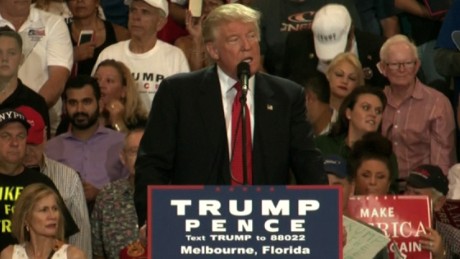
Washington (CNN)Donald Trump is angry that his aides and advisers have conceded to reporters -- largely without attribution -- that the Republican nominee struggled in his first presidential debate.
In a conference call with surrogates Wednesday afternoon, Trump aides made clear the Republican nominee is upset that his allies publicly acknowledged they pushed him to change his preparation and tactics before his next bout with Hillary Clinton. And he wants them to stop it immediately.
Trump wants his supporters to make an energetic defense of his performance and refuse to concede that he didn't nail it.
Trump's team told surrogates to say that Trump successfully reinforced his outsider status, contrasting him with Clinton as a status quo candidate, and to zero in on one-liners that they saw as successful -- particularly his repeated line that Clinton has been in public life nearly 30 years with little to show for it.
"The entire description of today's call is completely false and anybody saying otherwise is just making it up," he said.
The pushback comes amid reports that advisers hoped Trump's missteps against Clinton in the first debate would convince the Republican nominee to concentrate on his message and tactics before they debate again. Aides had said Tuesday and earlier Wednesday that they have delivered the message (gingerly, one said) that the first debate didn't go well.
Aides and advisers hoped Trump's refusal to participate in traditional debate preparation sessions -- instead favoring the impromptu, off-the-cuff approach that helped him through the GOP primaries -- might be eased after Monday night.
One ally described Trump as the kind of guy who can't simply be told a stove is hot -- he has to touch it to see for himself.
Another adviser said because of that reality, Monday's poor performance could be the best thing that could have happened to Trump.
"He just didn't use them," an adviser said. "Nobody is really sure why, but we're all certain he won't let opportunities pass next time around."
Ahead of their October 9 town hall style debate in St. Louis, part of the problem, one source said, is that Trump doesn't yet seem to grasp that he needs to expand his base of supporters to bring in new voters who are not yet sold on his temperament, policy positions or readiness to be president.
When Trump was told Tuesday that he should do some things differently, he responded that his approach is what his base likes.
Another challenge: There are a large number of voices -- sometimes disparate -- in Trump's orbit. Two advisers said that played a big role in what they saw as Trump's lack of a laser focus on the debate and his belief beforehand that he didn't need to rely on traditional prep.
Trump gravitated toward those who played to his instincts -- which, in hindsight, weren't in his best interest, two advisers said.
Those in Trump's orbit said the bottom line is it's his ballgame -- and no one else can convince him to do an about-face on how he approaches debate prep.
Trump aides weren't just frustrated with their candidate. They complained that the first debate's moderator, NBC's Lester Holt, didn't ask Clinton questions about controversies like the Clinton Foundation or the 2012 Benghazi attack -- while grilling Trump on his birtherism and his refusal to release his tax returns.
He chose not to broach those subjects -- or immigration, or appointments to the Supreme Court, two issues that could help him with Republicans -- and bears some of the blame for not pressing those issues, they said.
Trump's campaign sees opportunity for improvement ahead of the second debate, advisers said, particularly on his strongest issues -- trade and his argument as a change agent against Clinton's lengthy tenure in American politics.
CNN's Phil Mattingly and MJ Lee contributed to this story
Click here to view original web page at www.cnn.com






